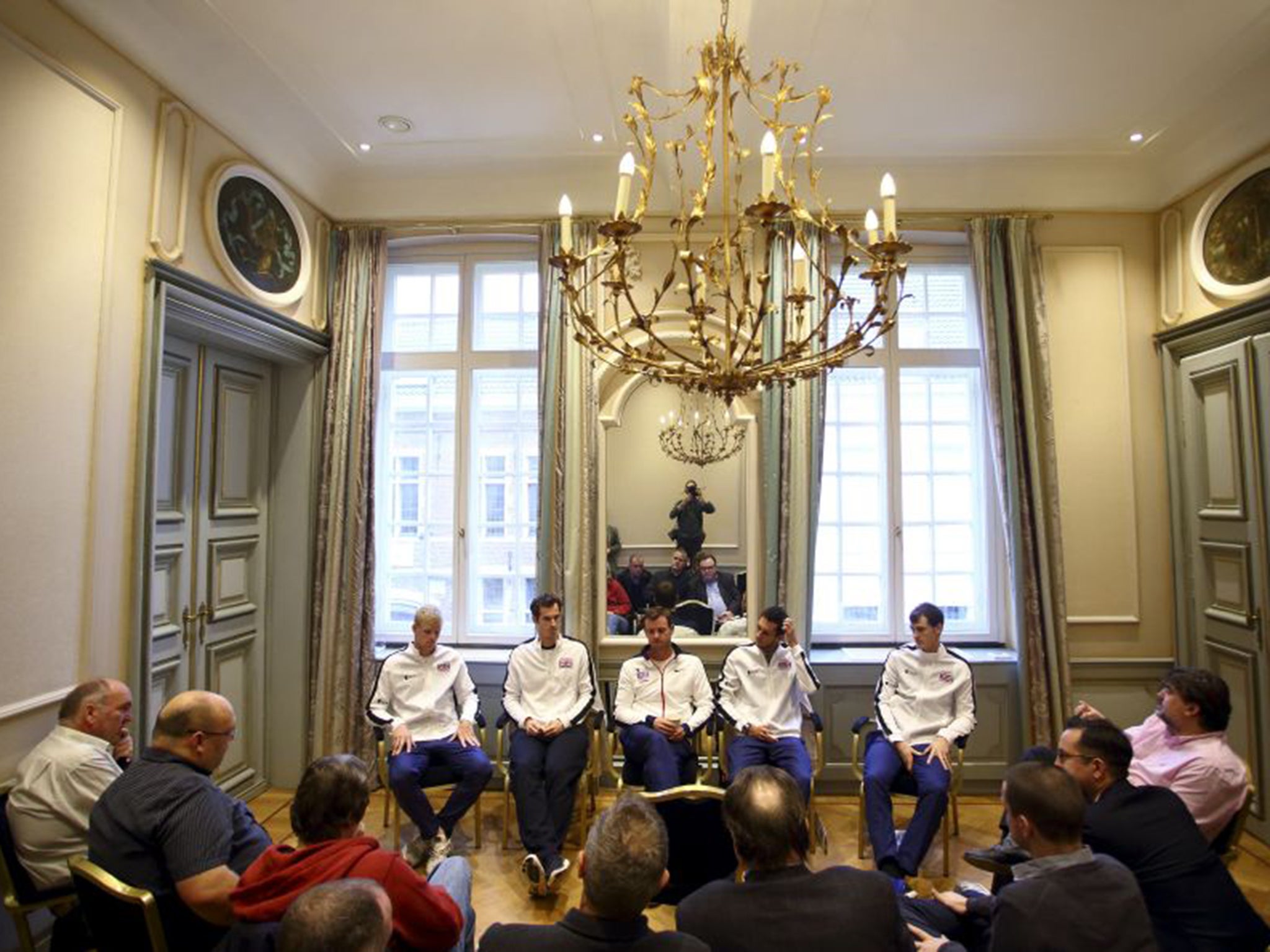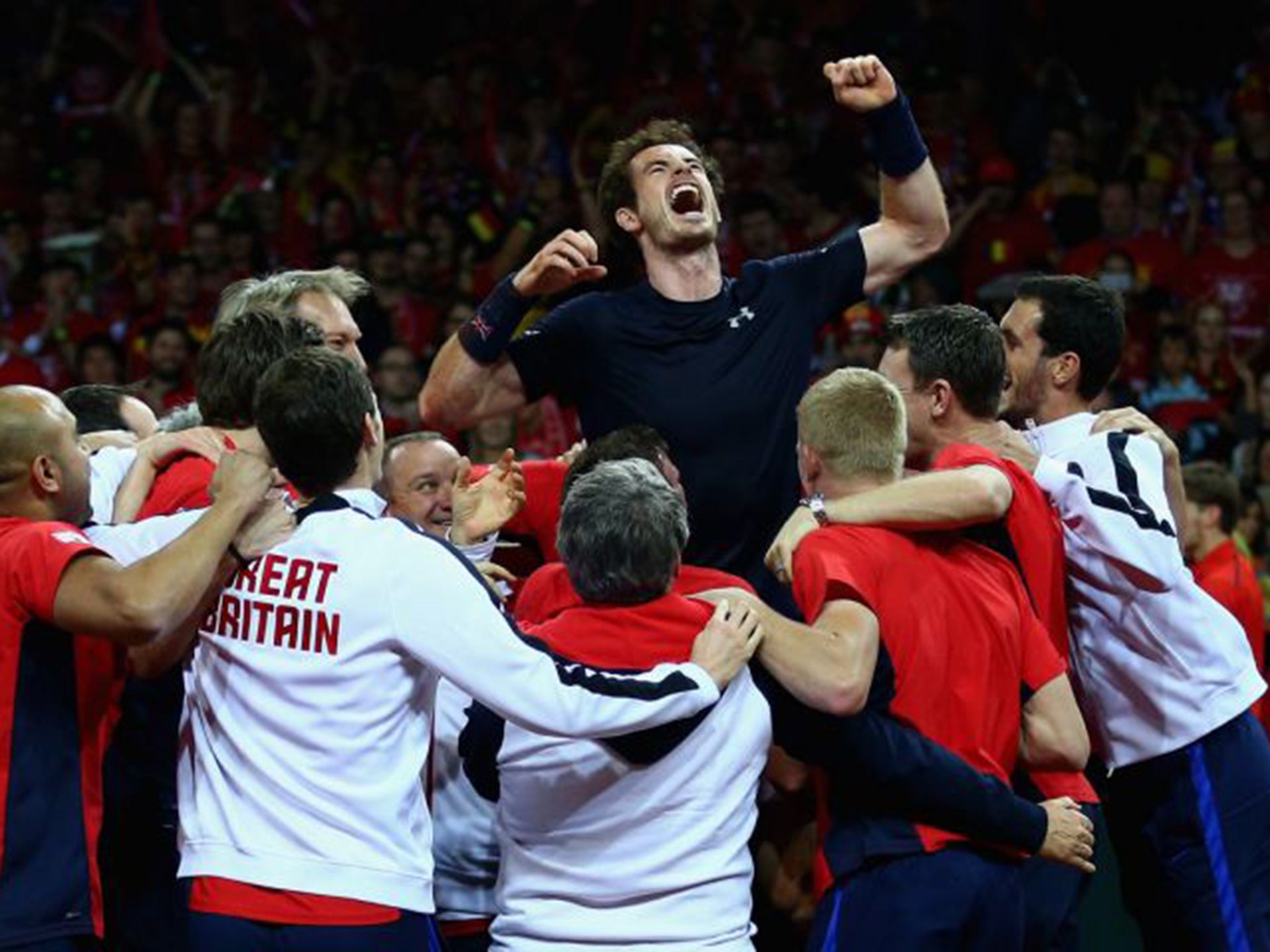How the LTA should build on glory of Davis Cup
History-making team urge governing body to act now in wake of Ghent joy. Paul Newman shows the way forward

1 Capitalise on the current British success
Britain top the International Tennis Federation’s world rankings in the wake of Sunday’s Davis Cup triumph. Andy Murray, twice a Grand Slam champion, is ending the year as the world No 2 for the first time.
There might never be a better opportunity to promote tennis in Britain, but is the Lawn Tennis Association ready to capitalise on the country’s first Davis Cup triumph for 79 years? Many feel that the national governing body missed a chance to cash in on Murray’s Wimbledon triumph two years ago and fear that lessons have not been learned.
Michael Downey, the LTA’s chief executive, was asked in Ghent how British tennis might take advantage of the Davis Cup team’s success. His response boiled down to the hope that the victory would generate good publicity for the next couple of weeks, that Leon Smith’s men might win an upcoming “team of the year” award and that next year’s first-round tie at home to Japan in March would be “the time when we really want to see the activation hit a high level because it’s coming into that important participation season of spring and summer”.
Andy Murray, whose mother, Judy, works tirelessly to promote tennis at ground level, said: “I obviously don’t get to see what is going on in schools in terms of the grassroots level, but there are obviously a few people who I am extremely close to and respect their opinions on it. They believe a lot more could be done and should be done to capitalise on all of this success in British tennis over the last five or six years. We may never get a better opportunity to do that than now.”
Smith said: “It’s not about what happens in the next few days. There will be plenty of coverage. It is about how we reel them in and keep them in.”
Jamie Murray described this as a moment that should not be wasted. “Andy has done such amazing things in his career and for tennis in this country and, of course, we have won the Davis Cup,” he said. “We have the opportunity to make tennis really popular.”

2 Reverse the decline in British junior performances
Laura Robson, Heather Watson and Oliver Golding have all won junior Grand Slam titles in recent years, but with the notable exception of 16-year-old Katie Swan there are currently very few British teenagers of great promise. Jamie Murray noted yesterday: “We went to the US Open in the last two years and there has not been one [British] boy playing.”
Andy Murray added: “Regardless of whether or not we had a load of players at the top of the professional game, the juniors were never a problem before. We always had good juniors. We had junior No 1s, we had juniors competing for Grand Slams on the guys’ and the girls’ side. Now it seems that isn’t really happening.”
The LTA’s strategy has been to get out of the business of employing its own coaches and instead to support local high-performance centres. “Over the last eight years I would guess £25m has gone into junior programmes,” Smith said. “Maybe it is spread too thinly. But it’s not worked, because there are no juniors.
“So do we start coaching them again? I don’t think that’s the answer. You have to trust the coaches out there that work very, very hard and try to help them as much as you can.”
3 Come up with a strategy – and stick to it
One problem for British tennis is the regular changes in direction. For example, under the LTA’s previous chief executive, Roger Draper, elite players received considerable financial support. That has been largely cut by Downey, who has put much greater emphasis on getting more people to play the game.
Downey appointed Bob Brett as his director of player development, but the Australian left after only a year, having dismantled much of the previous support structure.
A lengthy search for Brett’s successor ended with last month’s “interim” appointment of Peter Keen, who helped to transform British cycling. The LTA said it did not want to make a permanent appointment because so many candidates were contracted to national governing bodies until next summer’s Olympic Games – after which someone else might be brought in.
“There’s so much change,” Smith said. “Every time you change, you have to start again. We’ve now got another performance director who will have to go through another listening period before, I’m sure, another strategy unfolds.”
4 Make sure the National Tennis Centre is used
Whether or not you approved of the LTA’s huge investment in the National Tennis Centre at Roehampton, it is potentially an excellent training base for top players. However, few have used it since the LTA decided that coaching elite players was no longer part of its remit.
Smith said: “When we had a squad at the NTC, there was something that you could attach younger players to and there was at least an environment which people could drop into, whether it was these guys [in the Davis Cup team] or guys ranked between 200 and 500 who hit the ball well and could spar with everybody.
“That would have helped a good 14, 15, 16-year-old you could bring in quite a lot for certain weeks or more. It was the decision of Michael [Downey] and Bob [Brett] to move that nucleus on.”
5 Keep Leon Smith on board the British team
In the wake of Britain’s victory over Belgium, Smith was reluctant to talk about his own future as captain. Asked whether he had ambitions to coach a top player, he replied: “I’ve always said that I would quite like to do that at some point. I like what I do now, but I certainly can’t keep doing that for ever. I’m nowhere near retirement age.”
Smith has been a brilliant captain, taking Britain from the brink of the Davis Cup’s fourth tier to world champions. “He’s a special young man and probably the world’s best Davis Cup captain – and has been for a while,” Downey said. “There’s going to be a lot of nations probably reaching out to see what was special about Leon Smith because we sure need that in our country.”
How hard should the LTA try to keep Smith if he is tempted to work elsewhere? “Very hard,” Jamie Murray said. “The LTA need all the best coaches they can get. Leon’s proved that he’s a great coach, a great leader as well. It would be stupid not to want to have him on board and taking British tennis forward.”
Join our commenting forum
Join thought-provoking conversations, follow other Independent readers and see their replies
Comments
Bookmark popover
Removed from bookmarks